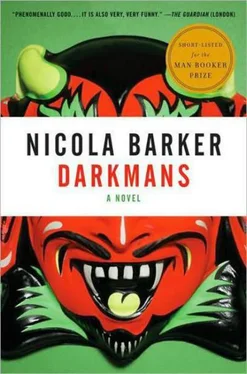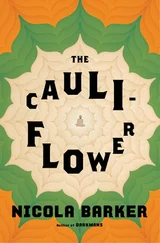Its origins were — at least in part — linguistic. From the moment they’d arrived in Germany, Isidore was only ever permitted to communicate in German. Laurie’s commitment to their new culture was absolute, and he needed his son’s to be. If Dory dared to speak in English then he was not only ignored, but chastised (nothing too severe — a sharp word, a quick slap to the back of the knee — but these punishments seemed terrible to such a mild and timid boy).
As luck would have it, Dory picked up his new tongue rapidly; even growing (over time) to admire its merciless precision, its bite and cut, its fearless accuracy. But the transition hadn’t been seamless (few transitions ever are). There’d been trauma suffered — at some level, however slight — and a tiny lesion had formed — a cut, a snag, a tear —between Dory’s fragile sense of ‘past’ and his avowed — his dedicated —future.
This lesion didn’t heal. It stubbornly persisted. And with time — and wear — it gradually abraded.
Words were at the heart of it; as if Dory’s entire character was not only ‘articulated’ by Anglo-Saxon (in some obscure way — ie the rhythm of the diction, the complexity of the grammar, the elegance of the styling) so much as totally defined by it.
He’d sometimes complain of feeling ‘a kind of niggling’ deep inside of him — like a hunger, almost a pining— as if the old tongue still existed somewhere, still chattered away, uninhibitedly, like an underground stream, tirelessly searching for a fault at the surface — a crack, a furrow, a weakness— anything —to allow it to flood through and overwhelm him.
He was rightly fearful of this babbling (it groaned and chuckled, in stops and starts, like the cranky Kurhaus plumbing), and yet in some strange way, this subterranean conflict also served to buffer him. It was a secret — a flow; a Dionysian current —which couldn’t be dammed, either by his own dogged conformity or his father’s pros-elytising.
He had no proper name for it, but even if he had, he wouldn’t’ve dared speak it. And there was actually no need (when all was finally said and done), because it spoke itself , constantly, creeping up on him — when he least expected it (while he was eating, sitting innocently in class, or out in the hills, walking) and blowing a sudden, icy blast of cold air on to the back of his neck; making him start and gasp, making the delicate hairs there stand stiff and erect.
Sometimes it would nudge him, furtively, whispering confidingly (grown-up things, secret things, things he couldn’t — or didn’t want to — understand). And sometimes it would just pester him, persistently — like a bad boy in class — elbowing him, nudging him, side-swiping and jostling him.
But it thrived — most of all — on ornate ambushes; lying low for hours — days, even — until he’d almost forgotten about it, then jabbing him, savagely, between the ribs, or shoving him, violently, from the back; sending him hurtling — hands out, eyes starting— terrifying him; making him roll up tight, into a ball, his arms over his head, his chin on his chest, his knees drawn in (like a spent fighter, receiving a kicking) until it finally emerged — powerful, victorious — from between his own lips, in the form of something which sounded suspiciously like…
But what?
A curse?
No…
A bellow?
No…
A cackle?
Well…
A laugh…?
Uh…
Sometimes more of a…a roar , and sometimes just a titter. Sometimes a yuk-yuk- yuk or a hoarse guffaw or a tee-hee- hee , or a single, sharp Ha! (It was nothing if not variable).
Dory never really saw the joke, somehow.
In fact he’d swallow it back if he could— bite it back. The effort this took (the sheer force of will) made his eyes stream and his lips turn purple. It stropped his throat. It made him burp . His deeply bemused father began prescribing chalk.
‘ Mein Gott . But how unbelievably tedious …’—the ten-year-old Isidore sometimes thought—‘to be the stranger everywhere…’: at school, where the other boys still mocked his accent and the girls found him ‘cute’ (because he was small for his age) and treated him like a plaything. Then at home, where there were always visitors, cheerfully — confidently — appropriating the vista (in that immediate way, that English way), the children especially, who arrived, choc-full of vicious territorial bravura.
And as much as he might yearn to, he could not–
Just can’t
— bring himself to speak with them (‘Not in German . Like a stranger? Never! But not in English, either. What if Father should hear?’), and so they quickly grew tired of him. They called him ‘dumb’ and ‘stupid’; ‘weird’, even. Sometimes they’d gang up on him (pelt him with pine cones in the forest, dunk him in the river), or — more often — they’d simply ignore him (like he was invisible, as if his ‘difference’, his ‘foreignness’, rendered him so).
But oh! How he admired their different clothes! The tunes they hummed! Their casual mobility! Their fantastic tv! Sometimes he’d hear them performing skits, or repeating catchphrases to each other, and he’d stop, and listen, and just drink it all in. Devouring, not exactly the ‘meaning’ (it was incomprehensible—‘My parrot is sick…’ meant nothing to him) but the rhythm. And that wonderful sense of blithe containedness at the heart of all humour (bizarre but self-perpetuating, like an Escher painting).
How complete they all were! How unified, how whole ! How desperately — how violently, how pathetically —he envied them!
Rebellion was never really an option. Isidore loved his parents and he believed in their philosophies (why shouldn’t he? They were all living, breathing proof of Kneipp’s peerless efficacy).
At dawn he would rise with his father and they would walk together, barefoot, in the dew-heavy grass. Summer or winter, it didn’t matter. It was a magical ritual, a ‘fundamental’.
They would talk about everything. His father would discuss the process of photosynthesis or the life-cycle of the stag beetle, he would curse the folly of the British Trade Union Movement (‘Thank God we are here, away from this indiscipline’), or question the motivation of Germany’s Green Party. He believed in biology, but not in Ecology. Politics, he held righteously, was how you held yourself, what you ate and how you lived. It was a series of apparently mundane decisions. It was ‘everyday’, ‘personal’, radiated ‘from within’. The other stuff? He’d snort, contemptuously: ‘Isidore, my boy, just showing off .’
Clare (she quickly modified her name to Clara) would quote whole pages, verbatim, from Homer’s Odyssey as she bustled, busily, around the Kurhaus kitchen. Isidore journeyed with her — sat quietly on a stool at the counter — weeping real tears for the unfortunate Odysseus (being hounded himself by vengeful Poseidon, appealing for help from the fleet-footed Athene, battling fearlessly with the Cyclops…
Take that, you…
Uh?
WAAAH! ).
He believed in God. He believed in Cruel Destiny…
But where was his Ithaca? Where was the home from which he’d strayed, and for which he yearned — more than anything–
Anything
— to finally return?
Was it here? There? Everywhere?
It was definitely a puzzle.
And the answer to this riddle?
Closer, much closer, than he could ever have imagined…
Читать дальше
Конец ознакомительного отрывка
Купить книгу












